Related Research Articles
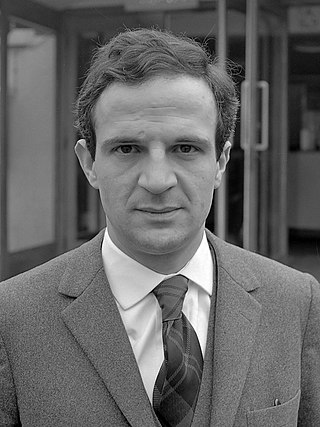
François Roland Truffaut was a French filmmaker, actor, and critic. He is widely regarded as one of the founders of the French New Wave. With a career of more than 25 years, he is an icon of the French film industry.

Jean-Luc Godard was a French and Swiss film director, screenwriter, and film critic. He rose to prominence as a pioneer of the French New Wave film movement of the 1960s, alongside such filmmakers as François Truffaut, Agnès Varda, Éric Rohmer and Jacques Demy. He was arguably the most influential French filmmaker of the post-war era. According to AllMovie, his work "revolutionized the motion picture form" through its experimentation with narrative, continuity, sound, and camerawork. His most acclaimed films include Breathless (1960), Vivre sa vie (1962), Contempt (1963), Band of Outsiders (1964), Alphaville (1965), Pierrot le Fou (1965), Masculin Féminin (1966), Weekend (1967) and Goodbye to Language (2014).

Alphaville: une étrange aventure de Lemmy Caution is a 1965 French New Wave science fiction neo-noir film directed by Jean-Luc Godard. It stars Eddie Constantine, Anna Karina, Howard Vernon, and Akim Tamiroff. The film won the Golden Bear award of the 15th Berlin International Film Festival in 1965.
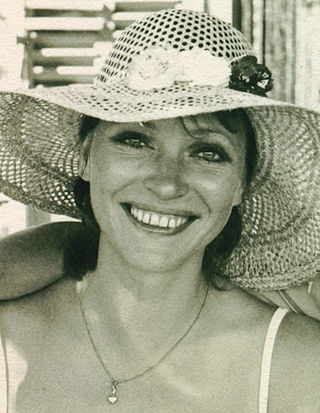
Anna Karina was a Danish-French film actress, director, writer, model, and singer. She was French New Wave director Jean-Luc Godard's early collaborator, performing in several of his films, including The Little Soldier (1960), A Woman Is a Woman (1961), My Life to Live (1962), Bande à part, Pierrot le Fou (1965), and Alphaville (1965). For her performance in A Woman Is a Woman, Karina won the Silver Bear Award for Best Actress at the Berlin Film Festival.

Breathless is a 1960 French New Wave crime drama film written and directed by Jean-Luc Godard. It stars Jean-Paul Belmondo as a wandering criminal named Michel, and Jean Seberg as his American girlfriend Patricia. The film was Godard's first feature-length work and represented Belmondo's breakthrough as an actor.

The New Wave, also called the French New Wave, is a French art film movement that emerged in the late 1950s. The movement was characterized by its rejection of traditional filmmaking conventions in favor of experimentation and a spirit of iconoclasm. New Wave filmmakers explored new approaches to editing, visual style, and narrative, as well as engagement with the social and political upheavals of the era, often making use of irony or exploring existential themes. The New Wave is often considered one of the most influential movements in the history of cinema.
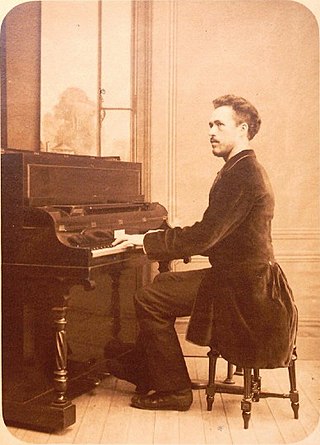
Benjamin Louis Paul Godard was a French violinist and Romantic-era composer of Jewish extraction, best known for his opera Jocelyn. Godard composed eight operas, five symphonies, two piano and two violin concertos, string quartets, sonatas for violin and piano, piano pieces and etudes, and more than a hundred songs. He died at the age of 45 in Cannes (Alpes-Maritimes) of tuberculosis and was buried in the family tomb in Taverny in the French department of Val-d'Oise.

Pierrot le Fou is a 1965 French New Wave romantic crime drama road film written and directed by Jean-Luc Godard, starring Jean-Paul Belmondo and Anna Karina. The film is based on the 1962 novel Obsession by Lionel White. It was Godard's tenth feature film, released between Alphaville and Masculin, féminin. The plot follows Ferdinand, an unhappily married man, as he escapes his boring society and travels from Paris to the Mediterranean Sea with Marianne, a girl chased by OAS hitmen from Algeria.

Anne Wiazemsky was a French actress and novelist. She made her cinema debut at the age of 18, playing Marie, the lead character in Robert Bresson's Au Hasard Balthazar (1966). A year later she married the director Jean-Luc Godard and appeared in several of his films, including La Chinoise (1967), Week End (1967), and One Plus One (1968).

Two or Three Things I Know About Her is a 1967 French New Wave film written and directed by Jean-Luc Godard, one of three features he completed that year. As with the other two, it is considered both socially and stylistically radical. Village Voice critic Amy Taubin considers the film to be among the greatest achievements in filmmaking.

La Chinoise, ou plutôt à la Chinoise: un film en train de se faire, commonly referred to simply as La Chinoise, is a 1967 French political docufiction film written and directed by Jean-Luc Godard about a group of young Maoist activists in Paris.

Mireille Darc was a French model and actress. She appeared as a lead character in Jean-Luc Godard's 1967 film Weekend. Darc was a Knight of the Legion of Honour and Commander of the National Order of Merit. Alain Delon was her longtime co-star and companion.
Charlotte and Her Boyfriend is a 13-minute 1958 film by Franco-Swiss director Jean-Luc Godard. It is shot entirely in or from a hotel room, in which Jules gives Charlotte a seemingly endless and self-indulgent tirade on her faults and his tribulations. Belmondo's voice is in fact dubbed by Godard.
Anne-Marie Miéville is a Swiss video and filmmaker whom Sight & Sound has called a "hugely important multimedia artist."
Georges de Beauregard was a French film producer who produced works by many of the French New Wave directors. In 1968, he was a member of the jury at the 18th Berlin International Film Festival. In 1983 he was awarded a Special César Award, the French national film prize.
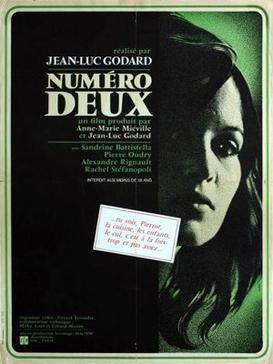
Number Two, by Jean-Luc Godard and Anne-Marie Miéville, is a 1975 experimental film about a young family in a social housing complex in France. The film's distinct style involves presenting two images on screen simultaneously, leading to multiple interpretations of the story and to comments on the film-making and editing process.
Here and Elsewhere is a 1976 documentary film by Jean-Luc Godard and Anne-Marie Miéville. It is a film essay, narrated by Godard and Miéville, which began as a film entitled Jusqu'à la victoire, undertaken by the Dziga Vertov Group, the partnership of Godard and Jean-Pierre Gorin who together made a number of political, pro-Marxist films between 1968 and 1972.
Agnès Godard is a French cinematographer. She is most famous for her long-running collaboration with filmmaker Claire Denis. For her work, she has won a César Award.

Paris Belongs to Us is a 1961 French mystery film directed by Jacques Rivette in his feature-length directorial debut. Set in Paris in 1957 and often referencing Shakespeare's play Pericles, the title is highly ironic because the characters are immigrants or alienated and do not feel that they belong at all.
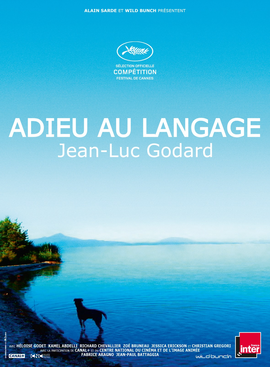
Goodbye to Language is a 2014 French-Swiss narrative essay film written and directed by Jean-Luc Godard. It stars Héloïse Godet, Kamel Abdeli, Richard Chevallier, Zoé Bruneau, Jessica Erickson and Christian Grégori and was shot by cinematographer Fabrice Aragno. It is Godard's 42nd feature film and 121st film or video project. In the French-speaking parts of Switzerland where it was shot, the word "adieu" can mean both goodbye and hello. The film depicts a couple having an affair. The woman's husband discovers the affair and the lover is killed. Two pairs of actors portray the couple and their actions repeat and mirror one another. Godard's own dog Roxy Miéville has a prominent role in the film and won a prize at the Cannes Film Festival. Like many of Godard's films, it includes numerous quotes and references to previous artistic, philosophical and scientific works, most prominently those of Jacques Ellul, Aleksandr Solzhenitsyn and Mary Shelley.